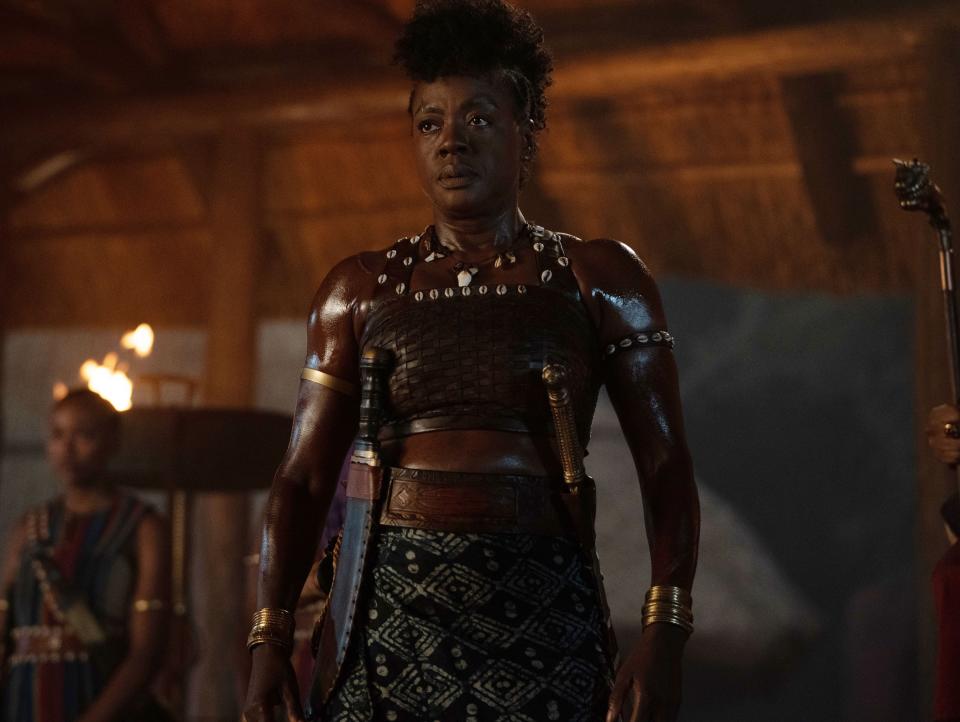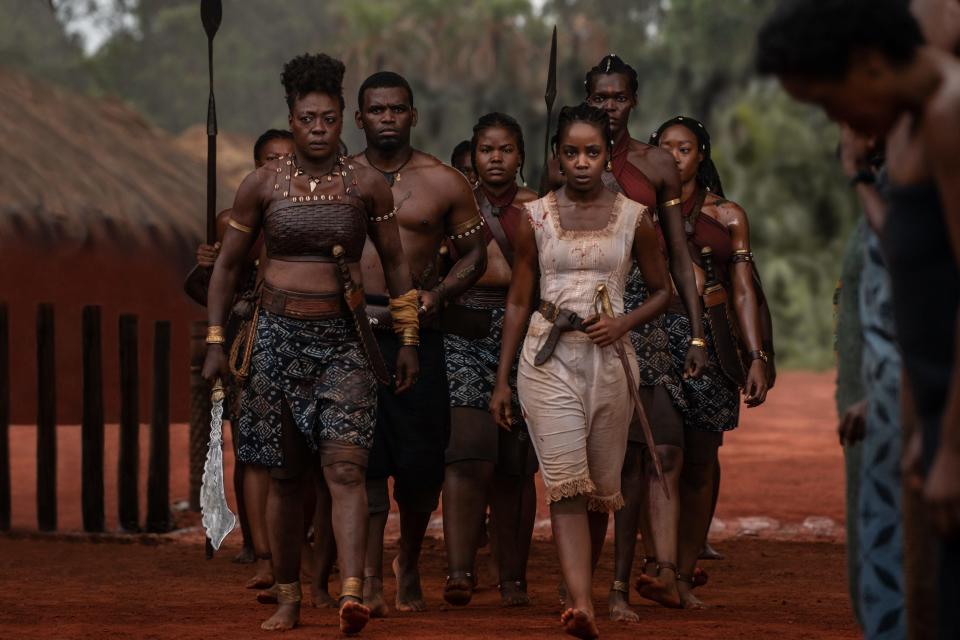Viola Davis' 'The Woman King' highlights joy, a less-depicted aspect of African storytelling
"The Woman King" is equal parts a story of slavery and resilience.
The Viola Davis-led film about the Agojie, the all-female African army that inspired the fictional Dora Milaje in Marvel's "Black Panther," centers on warriors tasked with protecting the people of Dahomey (modern-day Benin) and King Ghezo (played by John Boyega).
"The Woman King" also shows sides of the African continent that few Western audiences see in popular culture: royalty, wealth, prosperity and joy – even amid the slave trade.
"Moments of great joy and great tragedy are hand in hand," says Davis, who plays Agojie head general Nanisca in the historical epic, which is set in 1823. "And that makes life."

'The Woman King': Real-life epic embodies the fight in Viola Davis and her fellow stars
In the film, Agojie warriors attempt to free Dahomey from the shackles of their rival nation the Oyo empire, which demanded goods from the kingdom to avoid war. They also grapple with sacrificing their citizens and prisoners of war to the Atlantic slave trade. It's all about survival.
Despite death hanging over the women, there is laughter, dance and singing.
"We use dance and movement to heal from sadness, deal with grief and celebrate success," says Zoyi Lindiwe Muendane, a choreographer of the film. "African movement also comes from the expression of struggle and creating ways to maneuver through them."
Says director Gina Prince-Bythewood: "These are women who lived and died for each other. To envision yourself in that environment, I wanted to show the joy and what that must have felt like."
Fact checking 'The Woman King': What really happened, what didn’t in Viola Davis' historical epic
Too often, Hollywood stories about people of African descent – in particular, Black women – are rooted in struggle, and the cast and creators of "The Woman King" agree.
Screenwriter Dana Stevens wanted to highlight the "femininity" of the Agojie women through dancing and singing because of the historic "masculinization" of the warriors in literature told from the colonizers' point of view.
Artistic expression helped unite Agojie soldiers Nanisca, Amenza (Sheila Atim) and Izogie (Lashana Lynch) – and young recruit Nawi (Thuso Mbedu). Many of the songs and dances were used to call on their ancestors for protection in battle.
Agojie steps were incorporated "to keep it as authentic as possible," while styles from Nigeria, South Africa and Ghana made the dances "more appealing to our current generation," says choreographer Eugene Baloyi. Meanwhile, composer Terence Blanchard "navigated the sound of the film by using a traditional orchestra, West African percussion and a choir," Blanchard says.
Those aspects of "The Woman King" bonded the actors and created synchrony, just as it would have for the Agojie.
"It was great for us as actors to be able to have some fun. It was really needed," says Atim, adding that many joyous moments were unscripted.

Admire the Amazons in 'Wonder Woman'? You'll love the Dora Milaje in 'Black Panther'
One rainy day on the set saw an epic competition between a male Dahomey soldier and Agojie second-in-command Izogie. The trailer shows the scene where the two challenge each other by holding a double-sided spear against their collarbones as they try to get the other to submit.
While production stalled during the downpour, musicians began singing and drumming while others joined in to dance. "You just felt the incredible joy," Prince-Bythewood says.
Davis notes that the crew sang about getting the rain to stop and it eventually did. "It was a divine moment," she says.
To capitalize on the joy, Prince-Bythewood moved forward with shooting the competition between the male soldier and Izogie. "All that jumping and dancing and screaming (you see) was totally unscripted," she says.
'The Woman King' at CinemaCon: Viola Davis teases 'real-life Black Panther'
Another unscripted moment came when Grammy-winning Beninese singer Angélique Kidjo sang an Agojie fight song used for battle while on the set. Actresses Adrienne Warren, Lynch and Atim joined in and recorded the moment on their phones, which ended up in the movie.
While there has been criticism of the film's handling of accents and the way it tells the history of Dahomey's role in the slave trade, one thing filmmakers indisputably got right was the pride and joy Africans have in their culture.
Prince-Bythewood had many eyes on the movie before it arrived in theaters. One friend who was in a sorority told the director it "felt like she's 'watching the original sorority.' "
Contributing: Anika Reed
New movies this week: Hail to 'The Woman King,' skip 'See How They Run,' stream 'Do Revenge'
This is America: It's 2020 and I'm tired of watching movies centered on white people
This article originally appeared on USA TODAY: 'The Woman King': Viola Davis film brings joy to African storytelling

 Yahoo Movies
Yahoo Movies 
